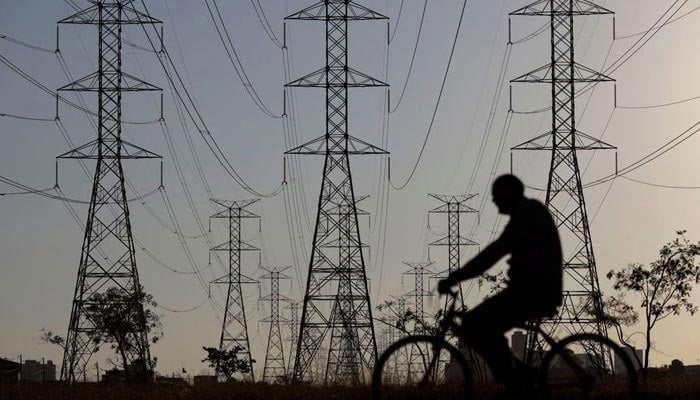Experts warn of looming grid crisis
Experts urge policymakers to develop strategy that balances renewable energy growth with grid reliability
ISLAMABAD: Pakistan’s national energy grid faces increasing pressure as more consumers turn to self-generated power, particularly solar energy, posing a threat to grid stability and long-term sustainability.
Experts at an annual plenary organized by the Sustainable Development Policy Institute (SDPI) on Thursday urged policymakers to develop a comprehensive strategy that balances renewable energy growth with grid reliability.
Adil Khattak, CEO of Attock Refinery and Attock Gen Limited, noted that while Pakistan is producing more energy than it consumes but despite that inefficiencies in the system hinder its transition to renewables. He emphasized that the rise in self-generated solar power — enabled through net metering, allowing solar owners to sell excess power back to the grid — has inadvertently created inequities. “Net metering puts a burden on those unable to afford solar panels, while those who can are moving off the grid, which destabilizes the overall energy system,” Khattak said. He added that despite these challenges, the transition to renewables is crucial but requires addressing structural issues in the energy system.
Tanveer Afzal Mirza, Company Secretary at United Energy Pakistan, highlighted the private sector’s growing interest in wind energy, which has attracted nearly $3 billion in investments. However, he pointed out that political and economic uncertainties, along with regulatory obstacles and inconsistent policies, are slowing further progress.
Hussain Talib, Head of External Affairs at Unilever Pakistan, emphasized the need for closer collaboration between the government and industry to achieve net-zero emissions, citing the Power Wheeling Coalition, a group working toward renewable energy policy reforms. He advocated for a liberalized energy market to support green initiatives but stressed that implementation responsibility lies with the government.
Tauseef H. Farooqi, former chairman of Nepra, criticized Pakistan’s current energy system, calling it “neither affordable, nor reliable and certainly not sustainable.” He urged greater private sector involvement but warned that without stable investment opportunities, progress will remain limited. One major issue raised was the need for affordable battery storage solutions to support renewable energy sources. Farooqi also updated participants on Pakistan’s Carbon Trading and Bilateral Contract Market (CTBCM) approved by Nepra in 2023 but noted the government still needs to set affordable wheeling charges for it to take effect.
Daniyal Siddiqui from DSC Energy Ltd. emphasized the importance of fast-tracking CTBCM to attract investment and help achieve green finance goals, while Shah Jahan Mirza, Managing Director of Private Power and Infrastructure Board (PPIB), warned that poor planning based on overestimated GDP growth projections has led to supply-demand imbalances. “The entire community must unite to reach net-zero emissions,” said Mirza.
Without decisive action from policymakers, Pakistan’s energy sector risks facing continued instability and inefficiency, he added.
-
 Jake Paul Criticizes Bad Bunny's Super Bowl LX Halftime Show: 'Fake American'
Jake Paul Criticizes Bad Bunny's Super Bowl LX Halftime Show: 'Fake American' -
 Prince William Wants Uncle Andrew In Front Of Police: What To Expect Of Future King
Prince William Wants Uncle Andrew In Front Of Police: What To Expect Of Future King -
 Antioxidants Found To Be Protective Agents Against Cognitive Decline
Antioxidants Found To Be Protective Agents Against Cognitive Decline -
 Hong Kong Court Sentences Media Tycoon Jimmy Lai To 20-years: Full List Of Charges Explained
Hong Kong Court Sentences Media Tycoon Jimmy Lai To 20-years: Full List Of Charges Explained -
 Coffee Reduces Cancer Risk, Research Suggests
Coffee Reduces Cancer Risk, Research Suggests -
 Katie Price Defends Marriage To Lee Andrews After Receiving Multiple Warnings
Katie Price Defends Marriage To Lee Andrews After Receiving Multiple Warnings -
 Seahawks Super Bowl Victory Parade 2026: Schedule, Route & Seattle Celebration Plans
Seahawks Super Bowl Victory Parade 2026: Schedule, Route & Seattle Celebration Plans -
 Keto Diet Emerges As Key To Alzheimer's Cure
Keto Diet Emerges As Key To Alzheimer's Cure -
 Chris Brown Reacts To Bad Bunny's Super Bowl LX Halftime Performance
Chris Brown Reacts To Bad Bunny's Super Bowl LX Halftime Performance -
 Trump Passes Verdict On Bad Bunny’s Super Bowl Halftime Show
Trump Passes Verdict On Bad Bunny’s Super Bowl Halftime Show -
 Super Bowl 2026 Live: Seahawks Defeat Patriots 29-13 To Win Super Bowl LX
Super Bowl 2026 Live: Seahawks Defeat Patriots 29-13 To Win Super Bowl LX -
 Kim Kardashian And Lewis Hamilton Make First Public Appearance As A Couple At Super Bowl 2026
Kim Kardashian And Lewis Hamilton Make First Public Appearance As A Couple At Super Bowl 2026 -
 Romeo And Cruz Beckham Subtly Roast Brooklyn With New Family Tattoos
Romeo And Cruz Beckham Subtly Roast Brooklyn With New Family Tattoos -
 Meghan Markle Called Out For Unturthful Comment About Queen Curtsy
Meghan Markle Called Out For Unturthful Comment About Queen Curtsy -
 Bad Bunny Headlines Super Bowl With Hits, Dancers And Celebrity Guests
Bad Bunny Headlines Super Bowl With Hits, Dancers And Celebrity Guests -
 Insiders Weigh In On Kim Kardashian And Lewis Hamilton's Relationship
Insiders Weigh In On Kim Kardashian And Lewis Hamilton's Relationship




